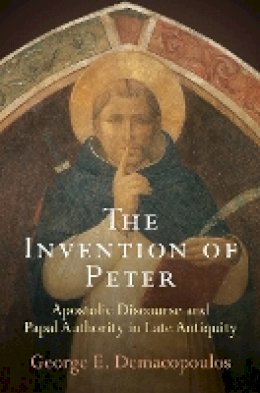
The Invention of Peter: Apostolic Discourse and Papal Authority in Late Antiquity
George E. Demacopoulos
On the first anniversary of his election to the papacy, Leo the Great stood before the assembly of bishops convening in Rome and forcefully asserted his privileged position as the heir of Peter the Apostle. This declaration marked the beginning of a powerful tradition: the Bishop of Rome would henceforth leverage the cult of St. Peter, and the popular association of St. Peter with the city itself, to his advantage. In The Invention of Peter, George E. Demacopoulos examines this Petrine discourse, revealing how the link between the historic Peter and the Roman Church strengthened, shifted, and evolved during the papacies of two of the most creative and dynamic popes of late antiquity, ultimately shaping medieval Christianity as we now know it.
By emphasizing the ways in which this rhetoric of apostolic privilege was employed, extended, transformed, or resisted between the reigns of Leo the Great and Gregory the Great, Demacopoulos offers an alternate account of papal history that challenges the dominant narrative of an inevitable and unbroken rise in papal power from late antiquity through the Middle Ages. He unpacks escalating claims to ecclesiastical authority, demonstrating how this rhetoric, which almost always invokes a link to St. Peter, does not necessarily represent actual power or prestige but instead reflects moments of papal anxiety and weakness. Through its nuanced examination of an array of episcopal activity—diplomatic, pastoral, political, and administrative—The Invention of Peter offers a new perspective on the emergence of papal authority and illuminates the influence that Petrine discourse exerted on the survival and exceptional status of the Bishop of Rome.
Product Details
About George E. Demacopoulos
Reviews for The Invention of Peter: Apostolic Discourse and Papal Authority in Late Antiquity
Early Medieval Europe
"Demacopoulos's meticulous study with helpful appendices should be read carefully by everyone, especially by those who think that they already know well enough the history of the early papacy."
Tarmo Toom, Journal of Theological Studies
"The Invention of Peter makes a valuable contribution to two fields that have not yet much affected each other: intellectual history of the papacy and late antique cultural studies. It encourages fresh, innovative scrutiny of a subject too important to languish."
Kevin Uhalde, Ohio University
